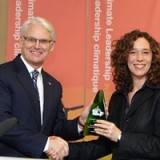In my last piece, “The myth of BC Liberal ‘nuetrality’ on Enbridge”, we established that not only are the BC Liberals far from neutral, but rather have been and continue to be complicit in a complex web of legal, administrative and political strategies designed to forward a multi-billion dollar infrastructure development program to enrich the largest most profitable companies on earth at the expense of our Province’s autonomy, economy and environment.
Since revealing some of the details that support these claims, issues have been unfolding rapidly on a number of fronts.
The NDP has established a “legal team” to look into some of the issues I specifically raised in the piece. This undertaking should fully explore and divulge the many maneuvers the BC Liberals have undertaken over the span of both Gordon Campbell’s and Christy Clark’s time in office which support the largest, most aggressive oil and gas agenda Canadians have ever experienced. As the issues come to the fore from this process I will continue to explore the history of the BC Liberals’ complicity in the oil and gas agenda.
Specifically, BC NDP Leader Adrian Dix singled out one pressing issue – the Equivalency Agreement (EA) I and others have worked to bring attention to. This is an action item. Part of the Liberal ‘missing in action’ strategy, defined by the Official Opposition as Government gone “AWOL”, is to let the EA stand despite recent changes by the Harper government which have fatally jeopardized its legitimacy. In legal terms, if BC continues to accept that they have no role or influence while letting the political and jurisdictional wrangling continue unabated, our ability to shape the future of these developments will be further eroded.
While there was significant foreshadowing of the BC Liberal desire to streamline approval processes, it was done under the guise of a clean energy strategy. In the 2010 Speech from the Throne, the BC Liberals included their desire to establish Equivalency Agreements in order to overcome “Byzantine” bureaucratic bungling that thwarted the much lauded Climate Change Strategy. Never mind that longstanding bureaucrats responsible for administering these processes see no need for such changes, as duplication was long ago eliminated and further streamlining is hardly required in functional terms.
2010 also saw the implementation of the Clean Energy Act and much to do about the green legacy Campbell was establishing; little known to us then was the fact that the augmented approval processes where going to be applied to infrastructure projects to export Alberta’s Dilbit, hardly clean and far from green. In fact, it appears the BC Liberals used their Climate Change Strategy roll-out to couch the required notice needed for the Equivalency Agreement that is now being applied to the Enbridge Pipeline Project, which may explain why no input from stakeholders ever occurred in the 60 days thereafter – a requirement laid out in the act in order to enable these agreements.
At the time, it was difficult to see through the puff and pageantry that surrounded the Climate Change Strategy and Clean Energy developments. There was a great deal of very public support for what amounted to a privatized power agenda for some of the largest companies on earth – and a mere two years later we are seeing the that the Clean, Green Energy strategy has served privatized power well.
In the next three months, British Columbians will be forking over 180 million dollars to private power producers, paying between $68-100 per Megawatt hour, meanwhile spot markets are hovering around 8 dollars per MWh. Hence, BC Hydro (read you) will be footing the bill for a mark-up of at least 700%! The Campbell “Green” strategy clearly becomes more about cold hard cash for private energy corporations than anything remotely environmentally related.
Meanwhile the environment Minister remains “Mum” on the current Joint Review Panel for the propsed Enbridge Northern Gateway pipelines. This despite having revealed his efforts to grease the skids of the project and the uncovering of his government’s coy ‘duck and cover’ media manipulation with respect to Northern Gateway. As a recent letter writer in the Burnaby Now enunciates, “BC Must Take a Stand Now” – in order to pull out of the EA process which affects four major oil and gas developments. However, he closes the piece saying he does not expect the government to do it.
And nor do I, which is why I went to great lengths to point out how the EA was established and how we might simply render it null and void.
Need further proof that this government will once again sit on its hands and look the other way while our sovereignty continues to erode? Then simply read this excerpt from the Premier’s response to Robyn Allan, whose open letter called for the revoking of the EA:
We appreciate the time that you have taken to share your views and insight with us and have forwarded your correspondence to the Honourable Terry Lake, Minister of Environment, for his review and consideration as well. You can be assured that the specific points you have raised in your letter will be included in related discussions between Minister Lake, members of his senior staff and officials in the Provincial Environmental Assessment Office.
A diplomatic PFO if I ever saw one. Ms. Allan had to follow up and re-request an actual response from the parties responsible for signing away our right to properly assess, participate and influence the single most pivotal development agenda in the Province’s history. Here is an excerpt of that re-request:
I am following up with you as the reply indicates that you will review and consider the letter and discuss the points with your officials. However, it does not confirm that you will address my comments in a reply to me.
Robyn Allan has an impressive breadth of hands-on experience and professional training which dictates her belief that if we do not move now to revoke the EA we will have lost one of our final opportunities to restore our decision-making capacity. This is of great importance and I look forward to hearing exactly what the newly established legal team Dix has appointed does in order to ensure this opportunity is not missed.
Everyday British Columbians can act now and pressure those in political office to move on this and if the BC Liberals do not revoke the agreement we can shine the light on how it was established outside the norm – as I did in my last piece – which may work to render it null and void.




